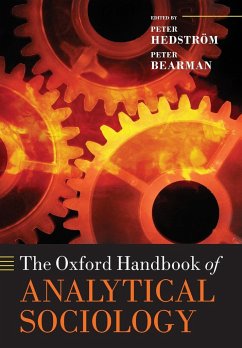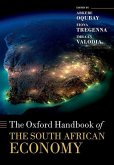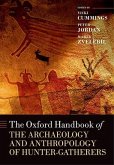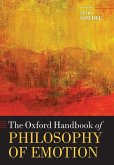The Oxford Handbook of Analytical Sociology
Herausgegeben von Hedström, Peter; Bearman, Peter
The Oxford Handbook of Analytical Sociology
Herausgegeben von Hedström, Peter; Bearman, Peter
- Broschiertes Buch
- Merkliste
- Auf die Merkliste
- Bewerten Bewerten
- Teilen
- Produkt teilen
- Produkterinnerung
- Produkterinnerung
This Oxford Handbook brings together some of the most prominent sociologists in the world to provide a comprehensive and authoritative examination of analytical sociology.
Andere Kunden interessierten sich auch für
![The Oxford Handbook of Archaeological Network Research The Oxford Handbook of Archaeological Network Research]() The Oxford Handbook of Archaeological Network Research182,99 €
The Oxford Handbook of Archaeological Network Research182,99 €![The Oxford Handbook of the South African Economy The Oxford Handbook of the South African Economy]() The Oxford Handbook of the South African Economy294,99 €
The Oxford Handbook of the South African Economy294,99 €![The Oxford Handbook of Megaproject Management The Oxford Handbook of Megaproject Management]() The Oxford Handbook of Megaproject Management57,99 €
The Oxford Handbook of Megaproject Management57,99 €![The Oxford Handbook of Causation The Oxford Handbook of Causation]() The Oxford Handbook of Causation77,99 €
The Oxford Handbook of Causation77,99 €![The Oxford Handbook of Political Behavior The Oxford Handbook of Political Behavior]() The Oxford Handbook of Political Behavior47,99 €
The Oxford Handbook of Political Behavior47,99 €![The Oxford Handbook of the Archaeology and Anthropology of Hunter-Gatherers The Oxford Handbook of the Archaeology and Anthropology of Hunter-Gatherers]() The Oxford Handbook of the Archaeology and Anthropology of Hunter-Gatherers76,99 €
The Oxford Handbook of the Archaeology and Anthropology of Hunter-Gatherers76,99 €![THE OXFORD HANDBOOK OF PHILOSOPHY OF EMOTION THE OXFORD HANDBOOK OF PHILOSOPHY OF EMOTION]() GoldieTHE OXFORD HANDBOOK OF PHILOSOPHY OF EMOTION75,99 €
GoldieTHE OXFORD HANDBOOK OF PHILOSOPHY OF EMOTION75,99 €-
-
-
This Oxford Handbook brings together some of the most prominent sociologists in the world to provide a comprehensive and authoritative examination of analytical sociology.
Hinweis: Dieser Artikel kann nur an eine deutsche Lieferadresse ausgeliefert werden.
Hinweis: Dieser Artikel kann nur an eine deutsche Lieferadresse ausgeliefert werden.
Produktdetails
- Produktdetails
- Oxford Handbooks
- Verlag: Oxford University Press
- Seitenzahl: 796
- Erscheinungstermin: 16. Juli 2013
- Englisch
- Abmessung: 244mm x 170mm x 43mm
- Gewicht: 1362g
- ISBN-13: 9780199587452
- ISBN-10: 0199587450
- Artikelnr.: 31387395
- Herstellerkennzeichnung
- Libri GmbH
- Europaallee 1
- 36244 Bad Hersfeld
- gpsr@libri.de
- Oxford Handbooks
- Verlag: Oxford University Press
- Seitenzahl: 796
- Erscheinungstermin: 16. Juli 2013
- Englisch
- Abmessung: 244mm x 170mm x 43mm
- Gewicht: 1362g
- ISBN-13: 9780199587452
- ISBN-10: 0199587450
- Artikelnr.: 31387395
- Herstellerkennzeichnung
- Libri GmbH
- Europaallee 1
- 36244 Bad Hersfeld
- gpsr@libri.de
Peter Hedström is a Professor of Sociology, Dean of the School of Social Sciences at Singapore Management University, and Official Fellow of Nuffield College at Oxford University. His area of specialization is analytical sociology. He has a special interest in the analysis of complex social networks, particularly analyses seeking to explain how the structure of the networks in which individuals are embedded influence the collective outcomes the individuals bring about. Peter Bearman is Director of the Lazarsfeld Center for the Social Sciences, the Cole Professor of Social Science, and Co-Director of the Health & Society Scholars Program. A recipient of the NIH Director's Pioneer Award in 2007, Bearman is currently investigating the social determinants of the autism epidemic. Current projects also include an ethnographic study of the funeral industry and, with support from the American Legacy Foundation, an investigation of the social and economic consequences of tobacco control policy.
* Foundations
* 1: Peter Hedström and Peter Bearman: What is analytical sociology all
about? An introductory essay by Peter Hedström
* 2: Peter Hedström and Lars Udéhn: Analytical sociology and theories
of the middle range
* Social Cogs and Wheels
* 3: Jon Elster: Emotions
* 4: Jens Rydgren: Beliefs
* 5: Jeremy Freese: Preferences
* 6: Trond Petersen: Opportunities
* 7: Dan Goldstein: Heuristics
* 8: Diego Gambetta: Signaling
* 9: Jon Elster: Norms
* 10: Karen Cook and Alexandra Gerbasi: Trust
* Social Dynamics
* 11: Michael Macy and Andreas Flache: Social dynamics from the bottom
up: Agent-based models of social interaction
* 12: Elizabeth Bruch and Robert Mare: Segregation dynamics
* 13: Michael Biggs: Self fulfilling processes
* 14: Matthew Salganik and Duncan Watts: Social influence: The puzzling
nature of success in cultural markets
* 15: Yvonne Åberg: The Contagiousness of Divorce
* 16: Katherine Stovel and Christine Fountain: Matching
* 17: Delia Baldassarri: Collective action
* 18: Meredith Rolfe: Conditional choice
* 19: James Moody: Network dynamics
* 20: Duncan Watts and Peter Dodds: Threshold models of social
influence
* 21: Christopher Winship: Time and scheduling
* 22: Scott Feld and Bernard Grofman: Homophily and the focused
organization of ties
* 23: Joel Podolny and Freda Lynn: Status
* 24: Ivan Chase and W. Brent Lindquist: Dominance hierarchies
* 25: Stathis Kalyvas: Conflict
* Perspectives from other fields and approaches
* 26: Richard Breen: Game theory
* 27: Iris Bohnet: Experiments
* 28: Hannah Brueckner: Surveys
* 29: Diane Vaughan: Analytical ethnography
* 30: Karen Barkey: Historical sociology
* 1: Peter Hedström and Peter Bearman: What is analytical sociology all
about? An introductory essay by Peter Hedström
* 2: Peter Hedström and Lars Udéhn: Analytical sociology and theories
of the middle range
* Social Cogs and Wheels
* 3: Jon Elster: Emotions
* 4: Jens Rydgren: Beliefs
* 5: Jeremy Freese: Preferences
* 6: Trond Petersen: Opportunities
* 7: Dan Goldstein: Heuristics
* 8: Diego Gambetta: Signaling
* 9: Jon Elster: Norms
* 10: Karen Cook and Alexandra Gerbasi: Trust
* Social Dynamics
* 11: Michael Macy and Andreas Flache: Social dynamics from the bottom
up: Agent-based models of social interaction
* 12: Elizabeth Bruch and Robert Mare: Segregation dynamics
* 13: Michael Biggs: Self fulfilling processes
* 14: Matthew Salganik and Duncan Watts: Social influence: The puzzling
nature of success in cultural markets
* 15: Yvonne Åberg: The Contagiousness of Divorce
* 16: Katherine Stovel and Christine Fountain: Matching
* 17: Delia Baldassarri: Collective action
* 18: Meredith Rolfe: Conditional choice
* 19: James Moody: Network dynamics
* 20: Duncan Watts and Peter Dodds: Threshold models of social
influence
* 21: Christopher Winship: Time and scheduling
* 22: Scott Feld and Bernard Grofman: Homophily and the focused
organization of ties
* 23: Joel Podolny and Freda Lynn: Status
* 24: Ivan Chase and W. Brent Lindquist: Dominance hierarchies
* 25: Stathis Kalyvas: Conflict
* Perspectives from other fields and approaches
* 26: Richard Breen: Game theory
* 27: Iris Bohnet: Experiments
* 28: Hannah Brueckner: Surveys
* 29: Diane Vaughan: Analytical ethnography
* 30: Karen Barkey: Historical sociology
* Foundations
* 1: Peter Hedström and Peter Bearman: What is analytical sociology all
about? An introductory essay by Peter Hedström
* 2: Peter Hedström and Lars Udéhn: Analytical sociology and theories
of the middle range
* Social Cogs and Wheels
* 3: Jon Elster: Emotions
* 4: Jens Rydgren: Beliefs
* 5: Jeremy Freese: Preferences
* 6: Trond Petersen: Opportunities
* 7: Dan Goldstein: Heuristics
* 8: Diego Gambetta: Signaling
* 9: Jon Elster: Norms
* 10: Karen Cook and Alexandra Gerbasi: Trust
* Social Dynamics
* 11: Michael Macy and Andreas Flache: Social dynamics from the bottom
up: Agent-based models of social interaction
* 12: Elizabeth Bruch and Robert Mare: Segregation dynamics
* 13: Michael Biggs: Self fulfilling processes
* 14: Matthew Salganik and Duncan Watts: Social influence: The puzzling
nature of success in cultural markets
* 15: Yvonne Åberg: The Contagiousness of Divorce
* 16: Katherine Stovel and Christine Fountain: Matching
* 17: Delia Baldassarri: Collective action
* 18: Meredith Rolfe: Conditional choice
* 19: James Moody: Network dynamics
* 20: Duncan Watts and Peter Dodds: Threshold models of social
influence
* 21: Christopher Winship: Time and scheduling
* 22: Scott Feld and Bernard Grofman: Homophily and the focused
organization of ties
* 23: Joel Podolny and Freda Lynn: Status
* 24: Ivan Chase and W. Brent Lindquist: Dominance hierarchies
* 25: Stathis Kalyvas: Conflict
* Perspectives from other fields and approaches
* 26: Richard Breen: Game theory
* 27: Iris Bohnet: Experiments
* 28: Hannah Brueckner: Surveys
* 29: Diane Vaughan: Analytical ethnography
* 30: Karen Barkey: Historical sociology
* 1: Peter Hedström and Peter Bearman: What is analytical sociology all
about? An introductory essay by Peter Hedström
* 2: Peter Hedström and Lars Udéhn: Analytical sociology and theories
of the middle range
* Social Cogs and Wheels
* 3: Jon Elster: Emotions
* 4: Jens Rydgren: Beliefs
* 5: Jeremy Freese: Preferences
* 6: Trond Petersen: Opportunities
* 7: Dan Goldstein: Heuristics
* 8: Diego Gambetta: Signaling
* 9: Jon Elster: Norms
* 10: Karen Cook and Alexandra Gerbasi: Trust
* Social Dynamics
* 11: Michael Macy and Andreas Flache: Social dynamics from the bottom
up: Agent-based models of social interaction
* 12: Elizabeth Bruch and Robert Mare: Segregation dynamics
* 13: Michael Biggs: Self fulfilling processes
* 14: Matthew Salganik and Duncan Watts: Social influence: The puzzling
nature of success in cultural markets
* 15: Yvonne Åberg: The Contagiousness of Divorce
* 16: Katherine Stovel and Christine Fountain: Matching
* 17: Delia Baldassarri: Collective action
* 18: Meredith Rolfe: Conditional choice
* 19: James Moody: Network dynamics
* 20: Duncan Watts and Peter Dodds: Threshold models of social
influence
* 21: Christopher Winship: Time and scheduling
* 22: Scott Feld and Bernard Grofman: Homophily and the focused
organization of ties
* 23: Joel Podolny and Freda Lynn: Status
* 24: Ivan Chase and W. Brent Lindquist: Dominance hierarchies
* 25: Stathis Kalyvas: Conflict
* Perspectives from other fields and approaches
* 26: Richard Breen: Game theory
* 27: Iris Bohnet: Experiments
* 28: Hannah Brueckner: Surveys
* 29: Diane Vaughan: Analytical ethnography
* 30: Karen Barkey: Historical sociology








